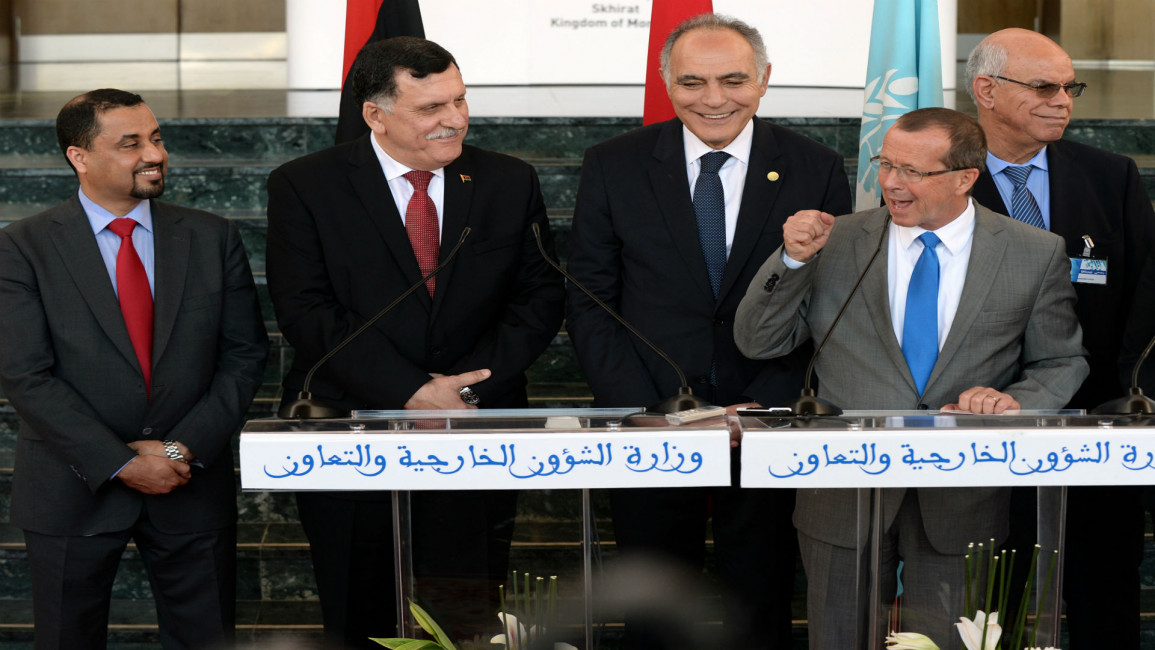Disagreements threaten to stall Libyan talks
Senior Libyan sources told The New Arab on Thursday that talks to form a unity government in the Moroccan resort of Skhirat were marred by disagreements and division.
A number of participants in the talks are angry with Fayez al-Sarraj, who is tasked with heading the unity government, for holding a meeting with controversial army chief Khalifa Hafter along with the deputy head of Egyptian intelligence, according to the sources.
Another thorny issue among participants is the reduced size of the cabinet after an initial line up was rejected for being too large.
A smaller cabinet will inevitably be harder to agree on as it complicates the task of accommodating the demands of the country's multiple political groups and militias.
"Participants are currently debating a cabinet of between 12 and 17 ministerial positions," said the Libyan sources.
"There has been an agreement on some of the names in the initial cabinet line up that might stay on in the new formation".
The sources suggested that the participants in the Skhirat talks might travel to Tunisia on Friday to meet with other signatories to December's UN-brokered agreement that requires the formation of a unity government in addition to UN special envoy to Libya Martin Kobler.
 |
World powers have been stepping up the pressure on Libyan rivals to reach an agreement on a unity government due to the increased threat of the Islamic State group |
 |
World powers have been stepping up the pressure on Libyan rivals to reach an agreement on a unity government due to the increased threat of the Islamic State group (IS), which has exploited the turmoil in Libya to expand its influence in the country and attack key oil facilities.
A US defence official on Thursday said the number of IS fighters in Libya is believed to be 5000, nearly double previous estimates.
The revelations come after the BBC reported on Wednesday that top IS commanders were taking refuge in Libya, as they come under increasing pressure from international airstrikes in Syria and Iraq.
Meanwhile, NATO defence ministers are set to meet in Brussels next week to evaluate the ongoing US-led coalition campaign against the IS group and to discuss ways of redoubling efforts.
Patrick Skinner, a former CIA case officer now with The Soufan Group consultancy, said the US has few good Libya options, but there is growing consensus something must be done.
"They are just terrified of it getting much worse, fast," Skinner told AFP.
"Once the Islamic State takes something, it's really hard and really bloody and really expensive to take it back."
Skinner said that US officials were hesitant to carry out airstrikes against IS in Libya to clean up a mess created by NATO airstrikes in 2011.
"That's actually what people are considering. Something has to be done. The horrible reality is: what is that something?"
The Obama administration has reasserted that it does not intend to take military action against IS at this time.
However White House spokesman Josh Earnest said on Thursday that the US will continue developments in the North African nation and "continue to be prepared to take action."
The US has already taken limited steps in Libya. In November, it launched an airstrike killing top IS leader Abu Nabil, an Iraqi also known as Wissam Najm Abd Zayd al-Zubaydi.
In December the Pentagon acknowledged that a group of US special operations troops who travelled to Libya to "foster relationships" was kicked out of the country soon after arriving.
Agencies contributed to this report



